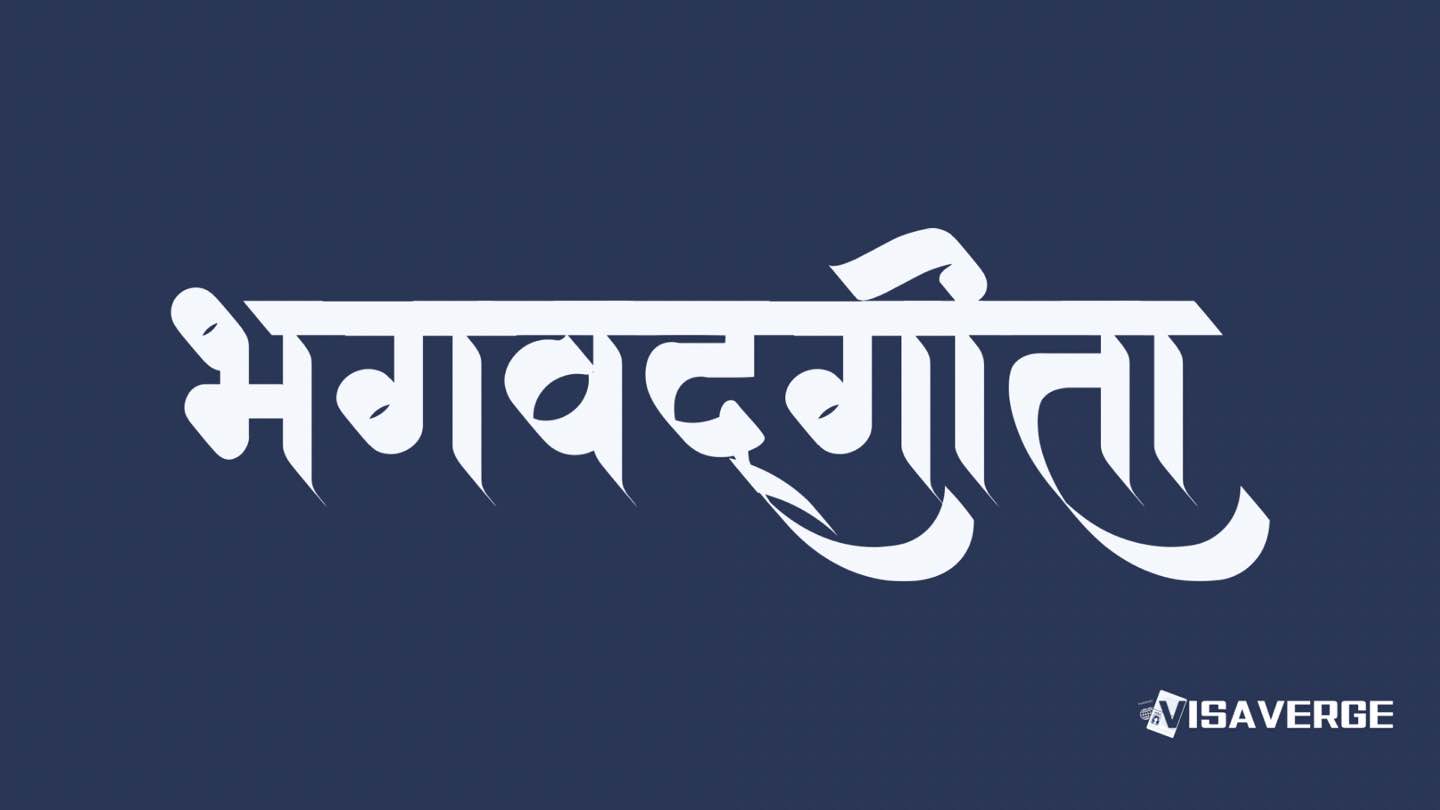A Historic Moment in Australian Politics
In a pivotal moment that marks a blend of cultural diversity and political history, Varun Ghosh, an Indian-origin barrister, has set a precedent in the Australian Senate. On a notable Tuesday, Ghosh had the honor of being the first India-born member of the Australian Parliament to take an oath on the Bhagavad Gita. This event signifies not only a personal milestone for Ghosh but also a broader acknowledgment of multicultural representation in Australian politics.

Varun Ghosh’s Journey to the Senate
Varun Ghosh, hailing from Western Australia, was chosen by both the Legislative Assembly and the Legislative Council to take up the crucial role of representing his state in the Senate of the Federal Parliament. His educational background is as impressive as his professional endeavors. Ghosh is a University of Western Australia alumnus, holding degrees in Arts and Law, and he’s also a distinguished Commonwealth Scholar in Law at the University of Cambridge.
His legal acumen was honed through his work as a finance attorney in New York and as a consultant for the World Bank in Washington, DC. Reflecting on his achievements and the values he stands for, Ghosh expressed his beliefs in the power of education:
“I have had the privilege of a good education and believe strongly that high-quality education and training should be available to everyone.”
Ghosh was once the fifth candidate on the Australian Labor Party’s Senate ticket in Western Australia during the 2019 federal election. Although he was not elected at the time, he persisted in his dedication to law and continued his work as a barrister.
Unwavering Support from Australian Politicians
The historical swearing-in on the Bhagavad Gita of the Indian-origin senator was greeted with a flood of support from his fellow politicians. Among the notable figures extending their congratulations was Australian Foreign Minister Penny Wong, who articulated the significance of Ghosh’s achievement:
“Wonderful to have you on the Labor Senate team,” Wong said, further adding, “Senator Ghosh is the first ever Australian Senator sworn in on the Bhagavad Gita. I have often said, when you’re the first at something, you’ve got to make sure you’re not the last. I know Senator Ghosh will be a strong voice for his community and for West Australians.”
Prime Minister Anthony Albanese echoed these sentiments, warmly welcoming Ghosh to the team and underscoring the expansiveness of the Australian community.
A Reflection of Cultural Diversity
The oath-taking by the Australian senator on the Bhagavad Gita goes beyond just a personal milestone for Ghosh; it reflects Australia’s growing cultural diversity and openness. His journey from moving to Perth in 1997, attending Christ Church Grammar School, and working his way up through prestigious institutions and high-profile legal cases, has culminated in this moment of inclusion and achievement.
Through this historical swearing-in ceremony, Ghosh embodies the Australian value of embracing varied backgrounds, faiths, and heritages within its government. His varied experience, from working with firms such as King & Wood Mallesons to handling legal affairs for banks, resource companies, and construction companies, Ghosh brings a wealth of knowledge and a unique perspective to the Senate.
Moving Forward
As Ghosh embarks on his legislative journey, the eyes of many—the Australian-Indian community, in particular—will be on how he uses his platform and voice to impact policy and represent his constituents. His landmark swearing-in on the Bhagavad Gita sends a clear message about Australia’s commitment to multiculturalism and adds a new chapter to the nation’s rich political history.
For those inspired by Varun Ghosh’s landmark swearing-in or looking to understand more about Australian immigration and the vibrant culture it fosters, further resources can be found on the official Australian Government Department of Home Affairs website.
Learn Today:
Glossary or Definitions:
- Barrister: A legal professional who specializes in courtroom advocacy and providing legal advice to clients. Barristers are typically self-employed or work in chambers and are recognized by wearing a wig and gown in court.
-
Australian Senate: One of the two houses of the Australian Parliament, responsible for representing the states and territories of Australia. Senators are elected by the public and serve as lawmakers.
-
Bhagavad Gita: A sacred Hindu scripture that is considered one of the important philosophical classics of all time. It is a 700-verse conversation between Prince Arjuna and the god Krishna, imparting spiritual wisdom and guidance.
-
Legislative Assembly: The lower house of a bicameral parliament, responsible for introducing and debating legislation. Members of the Legislative Assembly are elected by the public.
-
Legislative Council: The upper house of a bicameral parliament, responsible for reviewing, amending, and delaying legislation proposed by the Legislative Assembly. Members of the Legislative Council are typically elected or appointed.
-
University of Western Australia: One of Australia’s leading universities located in Perth, Western Australia, offering a wide range of undergraduate and postgraduate programs.
-
Commonwealth Scholar: An individual who has been awarded a scholarship by the Commonwealth Scholarship Commission to study in the United Kingdom. These scholarships are funded by the UK government and are usually awarded to exceptional individuals from Commonwealth countries.
-
Finance Attorney: An attorney who specializes in providing legal advice and representation in financial matters, such as corporate finance, securities, banking, and investment law.
-
World Bank: An international financial institution that provides loans and grants to the governments of countries for development projects. The World Bank aims to reduce poverty and support sustainable economic development.
-
Australian Labor Party: One of the major political parties in Australia, traditionally associated with center-left policies and representing the interests of workers and unions.
-
Swearing-in Ceremony: An official event in which an elected or appointed public official takes an oath of office, affirming their commitment to uphold the duties and responsibilities of their position.
-
Multiculturalism: The coexistence of multiple cultures within society, recognizing and valuing the diverse backgrounds, ethnicities, languages, religions, and traditions of individuals.
-
Australian Foreign Minister: The government official responsible for managing Australia’s external relations and representing the country on the international stage.
-
Prime Minister: The head of government in a parliamentary democracy, responsible for leading the executive branch of government and making important policy decisions.
-
Cultural Diversity: The existence of a variety of cultural identities, including different customs, practices, and beliefs, within a society.
-
Inclusion: The act of encompassing and valuing individuals from diverse backgrounds and ensuring their meaningful participation in various aspects of society.
-
Policy: A course or principle of action adopted or proposed by a government, political party, or organization to guide decision-making and achieve specific goals.
-
Constituents: The people living in a particular geographic area who are represented by an elected official, such as a senator or a member of parliament.
-
Multiculturalism: The policy or practice of encouraging the coexistence of diverse cultural groups within a society, respecting and valuing each group’s unique beliefs, traditions, and customs.
-
Government Department of Home Affairs: An Australian government agency responsible for managing immigration, citizenship, border control, national security, and law enforcement. The department oversees policies and programs related to immigration and provides information and services to individuals and organizations.
And there you have it, folks! Varun Ghosh’s historic swearing-in on the Bhagavad Gita has marked a significant moment in Australian politics, highlighting the country’s multicultural makeup. As we celebrate this achievement, let’s keep an eye on how Ghosh will use his voice in the Senate to make a difference. If you’re interested in exploring more about Australian immigration and the vibrant culture it embodies, head on over to visaverge.com for some great insights. Happy exploring!
This Article in a Nutshell:
In a historic moment, Varun Ghosh became the first Indian-born member of the Australian Parliament to take an oath on the Bhagavad Gita. This event highlights multicultural representation in Australian politics and symbolizes the country’s commitment to embracing diversity. Ghosh’s journey from a barrister to senator is an inspiration to many.






